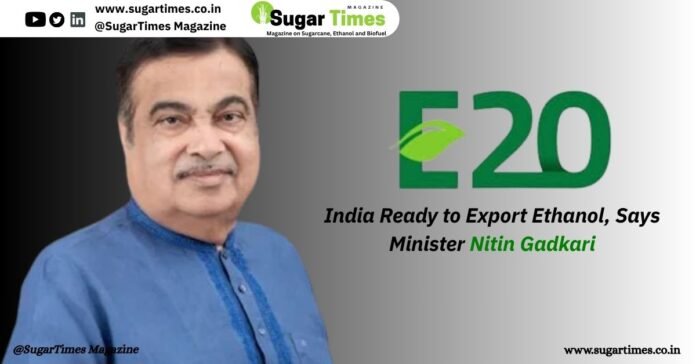New Delhi – After successfully achieving 20% ethanol blending in petrol, India is now producing more ethanol than it needs—and it’s time to start exporting it, said Union Minister for Road Transport and Highways, Nitin Gadkari, on Wednesday.
Speaking at the 2nd International Conference and Exhibition on Bioenergy and Technologies in New Delhi, Gadkari said,
“We need to reduce imports and increase exports. Since we now have a surplus of ethanol, exporting it should be our next step.”
India’s ethanol production has grown rapidly, reaching around 13 billion liters (1.3 crore kiloliters) by June 30, 2025. This growth has been driven by the government’s Ethanol Blended Petrol (EBP) program, which aims to mix 20% ethanol into petrol by the 2025–26 supply year. Ethanol in India is mainly produced from sugarcane-based molasses and grains like maize and rice.
As of July 31, 2025, the country had already achieved an average ethanol blending rate of 18.6%.
Gadkari praised Brazil as a leader in ethanol use but noted that India is catching up quickly. He highlighted how ethanol production has significantly increased farmer incomes—by about ₹45,000 crore annually.
He also talked about how agriculture can be diversified toward energy production. One example is converting rice straw (which is often burned and contributes to Delhi’s pollution) into ethanol and bio-CNG. “With 500 plants being built, rice straw will become a valuable source of energy instead of waste,” he said.
The minister also discussed innovations in biofuels, such as:
-
Bio-bitumen roads
-
Ethanol-powered generators
-
Flex-fuel vehicles (which can run on more than one type of fuel)
He noted that major automobile companies like Toyota, Tata, Mahindra, Suzuki, and Hyundai are developing vehicles that support biofuels. Tractor and construction equipment manufacturers are also adopting this technology.
Looking ahead, Gadkari highlighted the potential of green hydrogen and sustainable aviation fuel, with several pilot projects already in progress.
He stressed that promoting alternative fuels is key to cutting pollution, reducing fuel imports (which cost India ₹22 lakh crore annually), and boosting farmer incomes.
“Transport causes nearly 40% of India’s air pollution. Switching to ethanol, bio-CNG, and sustainable aviation fuel is no longer optional—it’s essential,” he said.
He concluded by saying that biofuels are more than just an environmental solution—they are a way to create jobs, strengthen rural economies, and support India’s goal of becoming self-reliant (Atmanirbhar Bharat).
“The sky is the limit for India’s biofuel future,” he said.





